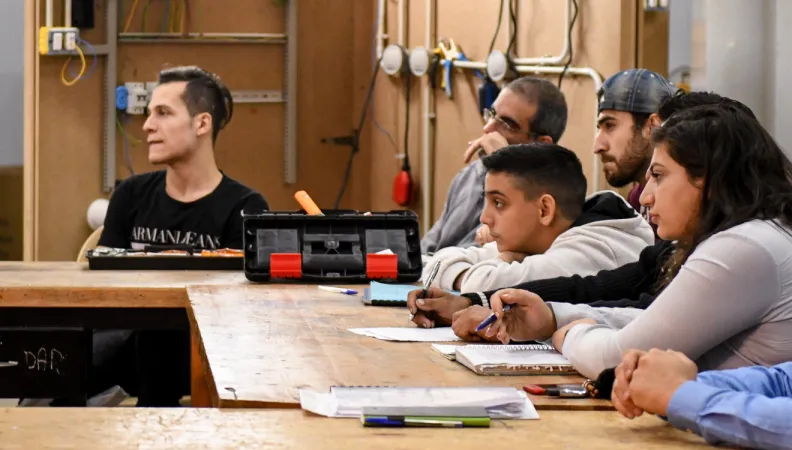Share the page
AFD in the Middle East: Promoting Societal Cohesion with Vocational Support and Training
Published on

Transnational armed groups, inter-religious and inter-ethnic conflicts, population displacements - warfare may have changed, but human insecurity is still very much a major challenge today. On the heels of the International Day of Peace on 21 September, a spotlight on AFD’s work in the Middle East and North Africa.
Conventional, interstate warfare has given way to a variety of kinds of armed conflict and non-state violence, which continues to cause untold levels of suffering. The challenge today lies in preventing and containing conflicts in order to build a sustainable peace. “Recovering better for an equitable and sustainable world” was the theme chosen by the United Nations this year for the International Day of Peace on 21 September, against the backdrop of the Covid-19 crisis.
This pandemic has added to political, religious and ethnic tensions around the world, in a period also marked by population displacement, not least in the Middle East, where AFD’s work strives to address the complications stemming from years of conflict.
Peace-building efforts in the Middle East
The Minka Middle East Initiative has a mandate to respond to the Iraqi and Syrian crises by focusing on forcibly displaced persons: over 15 million people have fled the wars in Syria and Iraq. Several million Syrians have left their country for Turkey, Lebanon and Jordan, while hundreds of thousands of Iraqis are still displaced in the country, in Kurdistan and elsewhere.
Further reading: Peace-building, to Prevent and Combat Crises
As the Iraqi army has since regained control of Mosul, some Iraqis have returned to the region that used to be controlled by “Daesh” or the so-called Islamic State. “A child born under Daesh doesn’t always have a civil status or has documents issued by Daesh which aren’t recognized by the Iraqi authorities,” says Thibault Notteghem, an AFD officer for crises and conflicts in the Middle East. “These families that have lived under the authority of the Islamic State, and sometimes nicknamed ‘Daesh families’, are stigmatized. These people are today ostracized and discriminated against.”
It is difficult to reconcile communities if there is no civil status. Indeed, it embodies the recognition of individuals in a society. “So, AFD contributes to the recovery of these territories by strengthening social cohesion, contributing to the social and vocational integration of young people and working on access to essential services for all,” says Notteghem. In the last five years, the Minka Peace and Resilience Fund has allocated €290 million in the Middle East.
Preventing tensions
Peace-building also requires work on social development in territories where tensions can quickly erupt into conflict. “For example, in Jordan, we’re working a lot on access to water and setting up vocational training,” says Thibault Notteghem.
Further reading: The Minka Middle East Exhibition
In Iraq, PERMA (Promoting Economic Revival for Microbusiness and Agriculture) aims to support some 2,000 farmers. This three-year program is helping to restart agricultural activity in Al-Hamdaniya in the Nineveh Plains. All the communities in the territory are concerned, such as Kurds, Sunnis, Shiites, Yazidis and Christians. The project benefits from some €10 million of financing through the Minka Initiative.
AFD also supports vocational integration projects in North Africa to address issues related to population displacement. For example, in Tunisia, a country affected by several crises, the economic situation drives many young people, who are often graduates, to leave the country. The partnership between AFD and the organizations Mercy Corps, which is specialized in the socioeconomic integration of young people, and Grdr, which implements local development strategies in migration areas, establishes “migration and development” action plans in conjunction with the Tunisian diaspora.
This project started in 2018 and works directly on the socioeconomic integration of young people in Jendouba, Médenine, Kasserine and Greater Tunis through the creation of companies and jobs and overall economic development of the region. Some €3.3 million has been allocated for this project supported by the European Union – actions which contribute to social cohesion on the ground.
The content of this publication is the sole responsibility of AFD and does not necessarily reflect the opinions of the European Union.
